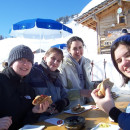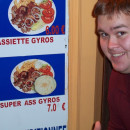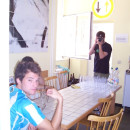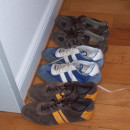IES EU: The Coolest and Most Integrative Academic Experience Europe Can Offer Past Review
By Elizabeth F (Tourism and Travel Services Management., The College of William and Mary) for
IES Abroad: Freiburg - European Union: Politics, Law & Economics
European Studies here at W&M emphasizes language and history, and this program offered me the political science and economic academic opportunities I hadn't taken at my home school. The courses also all complement each other and branch off a core of foundational information which is taught immediately in the program (during orientation). I could feel myself gaining experience and knowledge and being able to apply it, even if I couldn't always tell how the busy work was helping me. It was definitely an academically rewarding semester, and I would definitely recommend it to anyone interested in contemporary European politics, history, or economics, and also anyone interested in a lot of traveling and meeting people. It was a very social program in addition to good academics. I was very happy with my choice.
Review Photos




Personal Information
| How much international exposure did you have prior to this program? | 1 month - 6 months |
Review Your Program
|
* Overall educational experience
Academic rigor, intensity, resources, etc. |
The IES courses were not as rigorous academically as W&M courses; they involved more busy work but I strongly believed it was necessary to make students actually do the readings, which were so necessary for learning. I definitely retained this information very well because all class-based learning was supplemented with field study trips, where we traveled to EU institutions and got the chance to apply our knowledge by talking with very on-the-scene people. One military leader in Berlin talked briefly to us about the NATO strategy in Afghanistan, before he had to leave to present the policy he had just written to the German Parliament (we heard about it before they did!). It was an incredibly unique academic experience, and one which I definitely benefited from. |
|
* Host Country Program Administration
On-site administration of your program |
|
|
* Housing:
How satisfied were you with your living arrangements? |
Housing was arranged by the program, with the help of a survey submitted early in the process as to living preferences. I lived with 3 other Americans from my program and 4 Germans...my biggest complaint was living with the Americans, as I wasn't forced to use my German as much and felt somewhat separate from my German flatmates at first. Sheets were provided initially, which was great because I didn't have to bring them or buy them. All kitchen-wear was already there, laundry was easily accessible, and I lived within walking distance of everything I needed. Some other student apartments were farther from the center of the city and those students had to buy tram cards to get to classes or go out at night, which was somewhat annoying, but they chose that as a preference in their survey. There is a late bus operated by the city once the trams stop working for the night which is very cheap. |
| * Food: |
Food was not included in the program costs and can be somewhat expensive. Most students did their own grocery shopping and made meals for themselves, dietary needs were easily accommodated this way. The Mensa is the university dining hall and is VERY cheap - the food is usually pretty good and there are several choices per day at a range of prices (from 2eu to about 5eu). Eating out at restaurants is usually more expensive, except for Brenessel, which has a special every night from 6 to 7:30 - a huge plate of spaghetti bolognese for 1,80eu (a GREAT deal!). Most people ate a lot of Doeners, which is the German equivalent of fast food, kind of like a gyro - except even if you don't like gyro, you will like doeners. I consider myself a relatively picky eater, and I had NO problem finding food I loved. It's generally healthier than American food. |
|
* Social & Cultural Integration:
How integrated did you feel with the local culture? |
Besides the built-in field study trips that took us all over Europe, there were ample opportunities for independent weekend travel. The program arranged several hikes and field trips on the side also, the best being our trip to the Swiss Alps, where we could choose to ski or sled (even if you know how to ski, you should sled...like old-school tobogganing, going down a mountain at around 40mph!!). It was the BEST day EVER. |
|
* Health Care:
How well were health issues addressed during the program? |
|
| * Safety: |
Healthcare was very good, the program administrators were always available to help and make appointments with local doctors. Health insurance was very cheap also. We always felt well taken care of. Freiburg itself is a very safe city compared to most cities...we only had one bad incident, and that student was very drunk and wandered well outside the city limits before he got into serious trouble. Like any city, you always have to be careful, but I felt perfectly safe walking the 20 minutes back to my apartment at 2am by myself. |
| If you could do it all over again would you choose the same program? |
Yes
|
Finances
|
* Money: How easily were you able to live on a student's budget?
(1 = not very easy/$200+ on food & personal expenses/week, 2.5 = $100/week, 5 = very easily/minimal cost) |
|
| Do you have any general money-saving tips for future study abroad participants? | Girls, you will buy clothes, don't bring your entire closet! It is much cheaper to go grocery shopping and make your own meals...the market in the cathedral square has fresh produce and goods every morning and is very affordable. |
Language
| * Did your program have a foreign language component? | Yes |
| How would you rate your language skills at the beginning of the program? | Intermediate |
| What was the highest level language course you had completed prior to departure? | German 306 |
| If applicable, to what degree did your living situation aid your language acquisition? |
|
| Language acquisition improvement? |
My German class was very good, the program evaluates language skills onsite and places you in the class it feels is appropriate. It definitely made me feel more comfortable having for-knowledge of the language, and the instruction there helped enormously, my teacher was wonderful! Almost everyone over there speaks English, so it's certainly not necessary to know German beforehand, and this sometimes made it hard to practice my German with native speakers. |
Other Program Information
|
* Where did you live?
Select all that apply |
|
|
* Who did you live with?
Select all that apply |
|
A Look Back
| * What do you know now that you wish you knew before going on this program? | There were all different kinds of students, from all different majors on the program. If you come in with a foreknowledge of European history and issues, I think you get a lot more out of the program, but it certainly allows that some students will have almost no previous knowledge and accounts for that. I would say the field study trips (3 weeks of traveling, 9 weeks of class...that's pretty unique) and the Brussels internship make this program especially unique. Take advantage of that internship, it's an extremely rare opportunity!! |
Individual Course Reviews
| Course Name/Rating: |
Regions in Europe |
| Course Department: | PO320 |
| Instructor: | Hubertus Zander |
| Instruction Language: | English |
| Comments: | I love Hubertus. Period. He's so funny and I really loved the subject matter of this class, as we went through regional conflicts within Europe, ranging from the Balkans to Northern Ireland to Catalonia and Basque Spain. He was very knowledgeable and helpful. |
| Credit Transfer Issues: | No. |
| Course Name/Rating: |
German 202 |
| Course Department: | GRM202 |
| Instructor: | Uta |
| Instruction Language: | German |
| Comments: | Uta was an awesome teacher...we spoke all German, and she was extremely helpful. She tailored the course to what we wanted to focus on, speaking, writing, listening, or reading, and then added units that she thought we needed help with as we went. |
| Credit Transfer Issues: | No |








